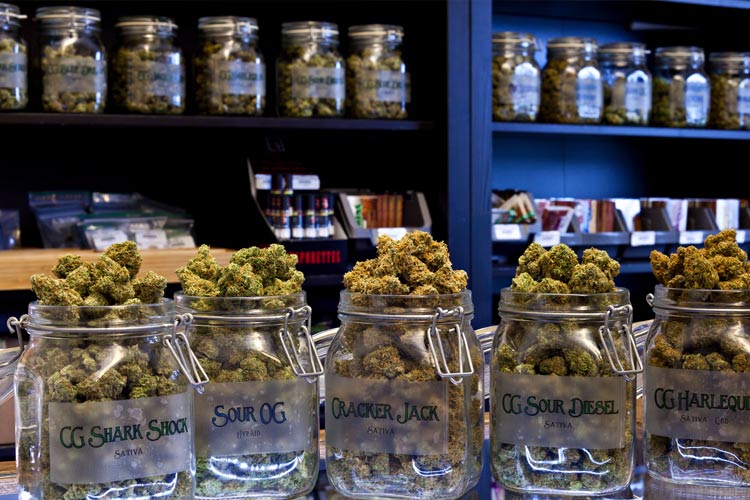How about some cannabis industry updates?
1. The day after
The Covid-19 storm will end at some point. That’s when states will survey the resulting economic wreckage and realize that new streams of tax revenue are a must-find to fund even basic and necessary governmental functions.
New York faced a daunting $4bln budget deficit even before the pandemic. Add to that the projected additional cost of $35bln so far caused by this virus (see: NBC-NY: State Shutdown ends May 15); and the result will be a fiscal Armageddon which will eviscerate the budgets of local police, fire department, hospitals, schools, etc. And that doesn’t count the overall misery of a job market and unemployment rate mired at depression-era levels.

New Growth From Economic Wreckage
In the meantime, New Frontier Data, a global cannabis research firm, projected US legal cannabis sales growth in 2020 to increase by 25% to more than $18bln. See: New Frontier Data Report
Want more evidence of business potential? How about retail sales in Illinois already averaging $35-$40 million/month even though the state launched only on January 1, and only a limited number of licenses have issued. See the Marijuana Business Daily video on Maine, Illinois and Missouri at: MJ Biz video- Maine, Illinois, Missouri;
A responsible governmental approach will require a no-nonsense look at legalizing adult use, including the tax revenue streams and the employment and business spikes it can produce, not only in New York but elsewhere. See Cannabis Business Times at: Legalization Watch: New York; and Oklahoma Legalization; Or Benzinga at: How legalizing cannabis can kick-start the economy;
Or note the reports of continued cannabis jobs growth on Politico at: Cannabis jobs in demand during economic crash;
Industry participants should prepare.

2. IRC §280E: Help from strange places?
First a rehash: Internal Revenue Code §280E disallows ordinary business expenses to companies engaged in illegal drug trafficking. After all, merchants of death should not enjoy tax deductions.
However, recreational THC remains a Schedule 1 drug and is just as illegal – to federal eyes – as heroin trafficking. The result is that IRC §280E deprives state legal cannabis businesses of the right to deduct most ordinary business expenses. And if you can’t deduct your normal operational expenses (rent, wages, insurance, etc.) from your revenue, then you will have an imputed and inflated taxable profit many times your true and actual profit. IRC §280E results in a heavily skewed anti-business tax framework for the cannabis industry, but this is a well-known adversity.
But now the news may get even worse.
Even before the pandemic kicked in, the IRS was percolating with reports that many cannabis companies were under-reporting revenue by deducting ordinary business expenses in violation of IRC §280E. Huge increases in federal tax audits were anticipated.
The Covid-19 pandemic does not help. When the smoke clears, the federal government, like the states, will be on a desperate hunt for tax revenue. Expect §280E audits to blossom all over the country. See MJ Biz Daily at: Uptick in federal audits foreshadowed;
But maybe there is some good news from an unanticipated corner. The Republicans, who are generally not sympathetic to the cannabis business, inserted an obscure provision (See the statute here: Internal Revenue Code Section 471[c]😉 into the 2017 Tax Cuts and Jobs Act. The provision may allow cannabis businesses with less than $25mm in average annual gross receipts to compensate for the destructive reach of §280E.
Without getting too much into the weeds, expenses categorized as “cost of goods sold” can, with accounting effort, be deducted to an extent from a cannabis company’s gross revenue.
So, the game is to re-characterize ordinary business expenses not deductible because of §280E into “costs of goods sold”; a category with more favorable tax treatment.
The IRS adopted rules sharply limiting a taxpayer’s ability to re-characterize many otherwise ordinary business expenses as “costs of goods sold.” But the theory now making the rounds is that the new statute changes that picture for a company with less than $25mm in average annual gross receipts. The balance of power is shifted and the IRS may have to bite its lip and respect a company’s private accounting methods for allocating expenses to “costs of goods sold.” We should expect that cannabis companies will take advantage of circumstances if the IRS is powerless to reverse an aggressive “costs of goods sold” allocation.
See Greenspoon Marder advance their argument at: 280E Under Attack?
Preparatory groundwork for this tax position needs to be laid down in advance. Lesson #1: Get a good cannabis CPA!

3. The COVID-19 Effect
The Covid-19 pandemic may have some positive consequences for the cannabis industry:
- Illegal to Essential:
This is the big one. Most state-legalized recreational cannabis dispensaries have been designated as “essential businesses” exempting them from mandated closure. After many decades of harsh governmental prosecution, the irony of characterizing formerly illicit cannabis use as “essential” to current day living is significant. It will have longstanding reverberations. See MarketWatch at: Pot shops deemed “essential”
- Non-Contact Shopping and Delivery:
Non-contact delivery of product has forced cannabis dispensaries to adapt. They have had to streamline curbside pick-up and delivery options to meet the crush of business, sometimes with social distancing requirements dictating that less staff perform to meet business needs at or higher than pre-pandemic levels. Less face-to-face time with budtenders required website digital enhancements to improve on-line shopping experiences. Perhaps dispensaries are now a step or two ahead of retail businesses which were compelled to close during the pandemic and may soon face the shock of a new business model. For example, see the article in DCist on Washington D.C.: Delivery in Washington D.C.; or Philadelphia Magazine on Pennsylvania practice: Coronavirus boosting cannabis in PA
- Sales Increase and Change.
New Frontier Data noted a 38% increase in sales across 27 legal cannabis markets over April, 2019, and LA Weekly noted edibles sales going from a pre-pandemic 12% to a current 22% of market share. See LA Weekly at: Best April yet but growth hampered
We thought the following article in Cannabis Business Executive contained an interesting roundtable discussion summarizing the pandemic’s effects on various industry segments: See: 10 industry leaders discuss coronavirus impact

1. As those in the cannabis industry may now know, House Democrats inserted SAFE Banking Act provisions into its next Covid-19 relief bill, titled the “Heroes Act.” But let’s not hold our breath on this one. The Heroes Act already faced the prospect of stiff opposition from the GOP-controlled Senate, even before the cannabis banking and financial services safe harbor provisions of the SAFE Banking Act were included.
2. Mexico’s deadline to establish a legal regimen for cannabis has been extended again; this time to December 15, 2020.
Back in October, 2018, Mexico’s Supreme Court ruled for the fifth time that cannabis use restrictions were unconstitutional, and it gave the Mexico national legislature 1 year to establish a legal regimen for cannabis use. That deadline has been twice extended as the legislature struggled to reach a national consensus. How long will the Court’s patience last before it takes matters into its own hands?
It’s interesting to note that once a Mexican cannabis industry is legalized, the United States will find itself bordered with cannabis tolerant jurisdictions on the north by Canada, and on the south by Mexico.
3. YouGov surveyed 27,000 adults in states where recreational cannabis has been legalized and 55% thought the policy was more a success than a failure and only 19% thought the policy was more a failure than a success. That’s a sign of a happy electorate!
4. Speaking of polls, in New Jersey, a Monmouth University poll found that 61% of New Jersey voters said that they will vote in favor of the cannabis legalization initiative on the ballot this November.
**********************************************************
Love to hear back from you at doug@wassruss.com if you have any comments, revisions, or more color to add.
Please feel free to forward to anyone who may find this content of interest. Join our mailing list with the form on the right.
Read all our Cannabis Legal News posts here
Till next time, and stay safe !!
Best – doug


